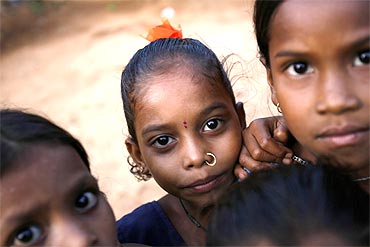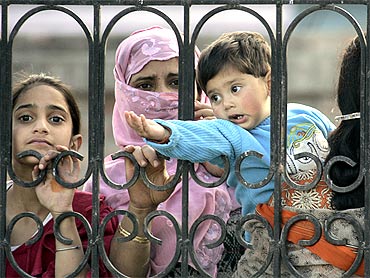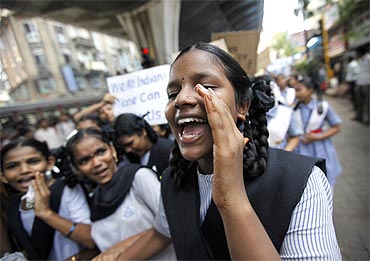Photographs: Desmond Boylan/Reuters
A new study has warned that in the next two decades, large parts of India will have an excess of young men by up to 20 percent because of sex selection.
It also said that a preference for sons, combined with easy access to sex-selective abortions, has led to significant imbalances in the male/female population and could have long-lasting implications.
In India, the gender imbalance is as high as 125 in Punjab, Delhi and Gujarat in the north, but is within normal levels in the southern and eastern states of Kerala and Andhra Pradesh.
The researchers said the same results are applicable to China and South Korea as well.
Please ..
20 per cent more men than women in India by 2030!
Image: A Kashmiri woman, with her children, looks through a gate, outside Baadam Vaer, during its re-opening ceremony in SrinagarPhotographs: Danish Ismail/Reuters
The sex ratio at birth -- the number of boys born to every 100 girls -- is consistent in human populations in which about 105 males are born to every 100 females.
However, with the advent of ultrasounds that enable sex-selection, the sex ratio at birth in some cities in South Korea climbed to 125 by 1992 and is over 130 in several Chinese provinces from Henan in the north to Hainan in the south.
"A consistent pattern in all three countries is the marked trend related to birth order and the influence of the sex of the preceding child," said Therese Hesketh, UCL Centre for International Health and Development, London, and co-authors.
20 per cent more men than women in India by 2030!
Image: A schoolgirl shouts slogans during a rally organised by a non-governmental organisation to appeal for peace and calm in MumbaiPhotographs: Danish Siddiqui/Reuters
If the first or second born are girls, couples will often sex select to ensure the second or third child is a boy.
The societal implications mean that a significant percentage of the male population will not be able to marry or have children because of a scarcity of women.
Policy makers in China, India and South Korea have taken some steps to address the issue, such as instituting laws forbidding foetal sex determination and selective abortion, but more can be done.
"To successfully address the underlying issue of son preference is hugely challenging and requires a multifaceted approach," said the authors.
The findings are published in the Canadian Medical Association Journal.




article